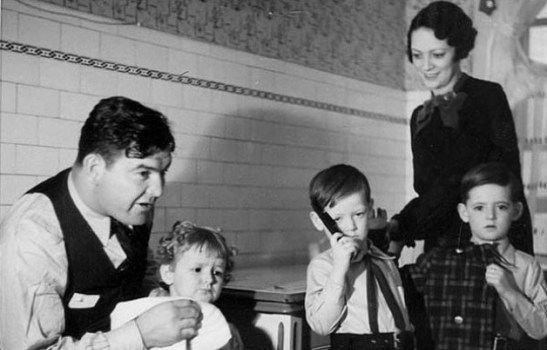
-“Wise & Foolish Virgins”, oil on panel by Frans I Floris, 16th century, 118 × 132 cm, in private collection.
“Then the kingdom of heaven shall be likened to ten virgins who took their lamps and went out to meet the bridegroom. Now five of them were wise, and five were foolish. Those who were foolish took their lamps and took no oil with them, but the wise took oil in their vessels with their lamps. But while the bridegroom was delayed, they all slumbered and slept.
“And at midnight a cry was heard: ‘Behold, the bridegroom is coming; let us go out to meet him!’ Then all those virgins arose and trimmed their lamps. And the foolish said to the wise, ‘Give us some of your oil, for our lamps are going out.’ But the wise answered, saying, ‘No, lest there should not be enough for us and you; but go rather to those who sell, and buy for yourselves.’ And while they went to buy, the bridegroom came, and those who were ready went in with him to the wedding; and the door was shut.
“Afterward the other virgins came also, saying, ‘Lord, Lord, open to us!’ But He answered and said, ‘Assuredly, I say to you, I do not know you.’
“Watch therefore, for you know neither the day nor the hour in which the Son of Man is coming.
-Mt 25:1-13
With the divorce rate in California above 70%, and assaults, disregard, and insults towards and dismissal of the institution of the family, the foundational building block of society, rampant in our modern dialogue, the mockery of the institution that is Hollywood marriages, I thought you might appreciate this reflection. The sinner always seeks to deceive and delude himself and others, eagerly, of the normality and praiseworthiness, mitigation of his sin. I know I do. How can/could he/she do otherwise? To admit?…The Prince of Lies is a great liar. Gen 3:5.
The nature of things are not changed by calling them something else, no matter how hard we try or want to to justify ourselves to ourselves and to others, to our consciences; to silence, to salve, to inebriate, to numb, to anesthetize, anything, even the eager, quick sale of our souls, at a substantial loss, rather than to listen to that.
The truth is always hardest, yet it remains the truth, regardless of us or our ravings or madness/delusions. We have been here before, many times. Read your history and the Scriptures. Jonah 3:4. This is not new. There is a saying, “There are no new heresies.” We just repackage, recycle, and reoffend. Kyrie eleison, Christe eleison, Kyrie eleison. Concupiscence.

-by Br. John Baptist Hoang, OP, fellow UVA alumnus
““Every athlete exercises discipline in every way. They do it to win a perishable crown, but we an imperishable one. Thus I do not run aimlessly; I do not fight as if I were shadowboxing.”
—1 Corinthians 9:25-26
The 2005 film, Cinderella Man, tells the remarkable story of Irish-American boxer James J. Braddock (1905-1974). Braddock, played by actor Russell Crowe, enjoys a successful career as an amateur boxer until life takes a turn for the worse at the threshold of the Great Depression. Like so many other Americans during that tumultuous time, Braddock struggles to make ends meet, barely managing to support his wife and three young children. In the end, however—as the title of the movie suggests—his life plays out like a modern-day fairy tale. His boxing career gradually picks back up, and the film ends triumphantly when he becomes the heavyweight champion of the world. He and his family, as the saying goes, live happily ever after.
Braddock is portrayed as the kind of person we all want to rally behind. Yet our sympathy for him goes beyond mere support for the underdog, mere pity for his life of hardship. There is actually something we come to love in James Braddock: he is a good man. He sacrifices everything he has for the sake of his wife and children. He sacrifices his own pride when he makes a desperate decision to beg for money from the rich and powerful. He risks his own life every time he steps into the ring to fight men who are quite capable of killing him. This is what evokes our admiration and sympathy: to see a man offer himself in love.
Of course, the protagonist has to have an antagonist, and the drama reaches its climax when Braddock faces his nemesis for the heavyweight title: the young and cocky Max Baer. But, whereas in many movies of this type the final fight scene is an epic battle between good and evil, in this film things are a little different. Baer isn’t evil; he’s just foolish. He’s portrayed as a playboy, who spends his time “fooling around” with several women.
Although this is a very inaccurate portrait of the real Max Baer, it is nevertheless a dramatically effective characterization, and it serves to draw out a distinction between two types of people: the just man and the fool. Braddock is the good and just man who remains a faithful husband and father throughout his life, while Baer is the fool who pursues a life of empty pleasure. Of course, Baer, for his part, regards Braddock as the fool, and in a sense this is true. Braddock is a fool for love and goodness; he is a fool in the eyes of the world. But in the eyes of God, he is both wise and just; he is a “good and faithful servant” (Matthew 25:3). Heavyweight title or no heavyweight title, his story reminds us that “the foolishness of God is wiser than human wisdom, and the weakness of God is stronger than human strength” (1 Corinthians 1:25).”

-James Braddock and Family, North Bergen, New Jersey, 1936. Standing is Braddock’s wife, May, and from left to right are his children: Rose Marie, Howard, and James, Jr.
Love,
Matthew
